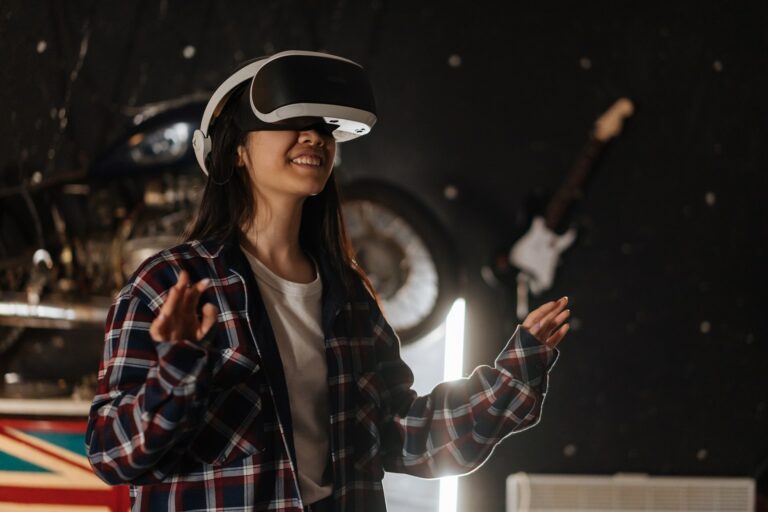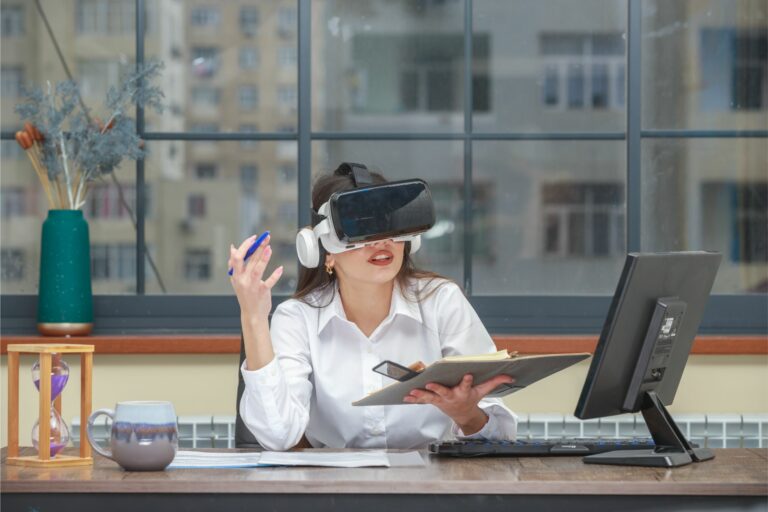Are you ready to step into the exciting world of XR (Extended Reality) and unlock a wealth of opportunities in the job market? As technology continues to evolve, so does our immersive digital experience, presenting a multitude of possibilities for both businesses and individuals alike. In this rapidly growing field, XR is revolutionizing industries such as gaming, entertainment, education, healthcare, and more. Whether you’re a tech enthusiast or a creative visionary, there has never been a better time to explore the diverse roles available in the XR job market. From virtual reality developers to augmented reality designers, the demand for skilled professionals is skyrocketing. So, how can you land your dream role in this exciting industry? Join us as we delve into the world of XR, uncovering the skills, qualifications, and insider tips that will set you apart and help you secure your place in this exhilarating field. Get ready to unlock endless possibilities and embark on a thrilling career journey in XR.
The growing demand for XR professionals
The XR job market is experiencing unprecedented growth, with companies across various industries recognizing the immense potential of this technology. As businesses seek to enhance user experiences, increase productivity, and gain a competitive edge, the demand for skilled XR professionals has soared. According to recent reports, the XR industry is projected to reach a market size of $209.2 billion by 2022, indicating a tremendous opportunity for aspiring XR enthusiasts. The combination of virtual reality (VR), augmented reality (AR), and mixed reality (MR) has opened up avenues for innovation in gaming, training, marketing, and beyond. Whether you’re interested in developing immersive applications, designing interactive experiences, or creating virtual worlds, the XR job market offers a plethora of exciting roles to explore.
The demand for XR professionals is not limited to a single sector. Industries such as gaming, entertainment, healthcare, real estate, engineering, education, and retail are actively incorporating XR technologies into their operations. Gaming companies are leveraging VR and AR to provide gamers with unparalleled experiences, while the entertainment industry is using XR to enhance live performances, movies, and theme parks. In healthcare, XR is revolutionizing patient care by enabling virtual surgeries, pain management, and mental health therapies. Real estate developers are utilizing XR to offer virtual property tours, and engineers are using it for immersive design and prototyping. XR is also transforming education, making learning more engaging and interactive. Retailers are adopting XR to provide customers with virtual try-on experiences and personalized shopping. The opportunities in XR span across multiple sectors, making it a versatile and in-demand field.
The rapid growth of XR has also been fueled by advancements in hardware and software technologies. From high-quality headsets to powerful graphical processing units, the tools and equipment required for XR development have become more accessible and affordable. Additionally, the increasing availability of software development kits (SDKs) and platforms has made it easier for aspiring XR professionals to enter the industry. With the combination of growing demand, expanding industries, and evolving technologies, the XR job market is ripe with opportunities for those willing to embrace this transformative field.
Key industries and sectors embracing XR
Gaming
The gaming industry has been at the forefront of XR adoption, utilizing VR and AR to create immersive and interactive gaming experiences. From virtual reality headsets to augmented reality games on smartphones, XR has revolutionized the way we play and engage with games.
Entertainment
XR technologies are being incorporated into the entertainment industry to enhance live performances, movies, and theme parks. From virtual reality concerts to augmented reality movie experiences, XR is bringing a new level of engagement and immersion to entertainment.
Healthcare
XR is transforming the healthcare industry by enabling virtual surgeries, pain management, mental health therapies, and medical training simulations. It has the potential to revolutionize patient care, improve treatment outcomes, and enhance medical education.
Real Estate
XR is being used in the real estate industry to offer virtual property tours, allowing potential buyers to explore properties remotely. It provides a realistic and immersive experience, saving time and resources for both buyers and sellers.
Engineering
XR is revolutionizing engineering by enabling immersive design and prototyping. Engineers can visualize and interact with virtual models, making it easier to detect design flaws and improve the overall design process.
Education
XR is transforming education by making learning more engaging and interactive. Students can explore virtual environments, conduct virtual experiments, and interact with virtual objects, enhancing their understanding and retention of complex concepts.
Retail
XR technologies are being adopted by retailers to provide customers with virtual try-on experiences and personalized shopping. Virtual reality mirrors and augmented reality apps allow customers to visualize products in real time, enhancing the shopping experience.
These key industries and sectors are just a few examples of how XR is being embraced and integrated into various fields. As the technology continues to evolve, the opportunities for XR professionals will only continue to grow.
XR job market statistics and trends
The XR job market is experiencing exponential growth, with an increasing number of companies recognizing the value of XR technologies. According to a report by MarketsandMarkets, the XR market is projected to grow at a compound annual growth rate (CAGR) of 45.7% from 2019 to 2024. This growth is primarily driven by the demand for immersive experiences and the need for businesses to stay competitive in a rapidly evolving digital landscape.
In terms of job roles, the XR industry offers a wide range of opportunities. Some of the most in-demand roles include XR developers, XR designers, XR artists, XR engineers, XR content creators, and XR project managers. These roles require a combination of technical skills, creative abilities, and an understanding of user experience (UX) design principles.
In addition to technical skills, soft skills such as problem-solving, communication, and teamwork are highly valued in the XR industry. As XR projects often involve cross-functional teams and collaboration with stakeholders, the ability to effectively communicate and work well with others is crucial.
One of the emerging trends in the XR job market is the demand for specialized skills and expertise in specific industries. For example, healthcare companies are seeking XR professionals with a background in medical imaging and patient care, while gaming companies are looking for XR developers with experience in game design and programming. As XR continues to expand into different sectors, professionals with domain-specific knowledge will be highly sought after.
Another trend in the XR job market is the rise of freelancing and remote work opportunities. With advancements in connectivity and collaboration tools, XR professionals can work remotely and collaborate with teams from around the world. This flexibility allows individuals to take on projects from various industries and work on cutting-edge XR technologies without being limited to a specific geographic location.
Overall, the XR job market is experiencing rapid growth and offers a range of exciting opportunities for professionals with the right skills and qualifications. By staying up-to-date with the latest trends and honing the necessary skills, individuals can position themselves for success in this dynamic field.
Skills and qualifications required for XR roles
To thrive in the XR job market, it is essential to possess a combination of technical skills, creative abilities, and domain knowledge. Here are some of the key skills and qualifications required for XR roles:
Programming and development skills
Proficiency in programming languages such as C++, C#, JavaScript, and Unity is crucial for XR developers. Understanding the principles of object-oriented programming and having experience with XR development frameworks and tools are also highly valued.
Design and artistic skills
XR designers and artists should have a strong sense of aesthetics and an eye for detail. Proficiency in graphic design, 3D modeling, animation, and user interface (UI) and user experience (UX) design is essential for creating immersive and visually appealing XR experiences.
Domain-specific knowledge
Depending on the industry you plan to work in, having domain-specific knowledge can give you a competitive edge. For example, if you’re interested in healthcare XR, understanding medical imaging, anatomy, and patient care can be advantageous.
Problem-solving and critical thinking
XR professionals often encounter complex challenges that require creative problem-solving and critical thinking skills. The ability to analyze problems, think outside the box, and find innovative solutions is highly valued in the XR industry.
Collaboration and teamwork
XR projects often involve cross-functional teams and collaboration with stakeholders from different departments. The ability to collaborate effectively, communicate ideas, and work well with others is crucial for success in the XR job market.
Continuous learning and adaptability
The XR industry is constantly evolving, and new technologies and tools are being introduced regularly. Being open to learning new skills, staying up-to-date with industry trends, and adapting to changes are essential for long-term success in the XR job market.
In addition to these skills, having a strong educational background or relevant certifications can enhance your credibility and increase your chances of securing XR roles. Pursuing a degree in computer science, game development, graphic design, or a related field can provide a solid foundation for a career in XR.
Building a strong XR portfolio and resume
When applying for XR roles, having a strong portfolio and an impressive resume is essential to showcase your skills and stand out from the competition. Here are some tips for building a strong XR portfolio and resume:
Showcase your best work
Select your most impressive XR projects and include them in your portfolio. Demonstrate your ability to create immersive experiences, attention to detail, and technical expertise. Include screenshots, videos, or links to interactive demos to give potential employers a glimpse of your work.
Highlight your technical skills
In your resume, clearly outline your technical skills and expertise in XR development frameworks, programming languages, software tools, and hardware platforms. Be specific about your experience with VR, AR, and MR technologies.
Include relevant experience
If you have previous experience working on XR projects or in related industries, highlight this in your resume. Include details about the projects you worked on, your role and responsibilities, and the outcomes or impact of your work.
Describe your creative process
In your portfolio and resume, explain your creative process and how you approach XR design and development. Discuss your problem-solving strategies, your understanding of user experience principles, and your ability to create immersive and engaging experiences.
Provide references and testimonials
If you have worked with clients, collaborators, or supervisors who can vouch for your skills and work ethic, include their contact information or request testimonials. Positive references can significantly enhance your credibility and demonstrate your professionalism.
Continuously update your portfolio and resume
As you gain more experience and complete new projects, regularly update your portfolio and resume to showcase your latest work. Remove outdated or less relevant projects to keep your portfolio focused and impressive.
Remember, your portfolio and resume should reflect your unique skills, creativity, and passion for XR. Tailor your portfolio to the specific role or industry you are targeting and ensure that it accurately represents your abilities.
Networking and connecting with XR professionals
Networking plays a crucial role in landing your dream role in the XR industry. Building connections with XR professionals can open doors to new opportunities, provide valuable insights, and expand your knowledge. Here are some ways to network and connect with XR professionals:
Attend industry events and conferences
XR conferences, trade shows, and industry events offer excellent opportunities to meet professionals in the field. Participate in panel discussions, attend workshops, and engage in conversations with fellow attendees. Be proactive in exchanging contact information and following up with potential connections.
Join XR communities and online forums
Online communities and forums dedicated to XR are a great way to connect with like-minded professionals. Participate in discussions, ask questions, and share your knowledge and expertise. Platforms such as Reddit, LinkedIn groups, and specialized XR forums can provide valuable networking opportunities.
Collaborate on XR projects
Seek out opportunities to collaborate with other XR professionals on projects. Participate in hackathons, game jams, or join XR development teams. Collaborative projects not only allow you to showcase your skills but also provide a chance to learn from others and establish valuable connections.
Use social media
Utilize social media platforms such as LinkedIn, Twitter, and Instagram to connect with XR professionals and industry influencers. Follow relevant hashtags, engage in conversations, and share your work to gain visibility within the XR community. Building a strong online presence can attract opportunities and connections.
Reach out to mentors and industry experts
Identify professionals in the XR industry whom you admire and reach out to them for mentorship or guidance. Many experienced XR professionals are willing to share their insights and offer advice to aspiring individuals. Attend webinars or workshops hosted by industry experts and take advantage of the opportunity to connect with them.
Remember, networking is a two-way street. Be genuine in your interactions, offer help and support to others, and maintain professional relationships. Building a strong network of XR professionals can not only help you find job opportunities but also provide ongoing support and learning opportunities throughout your career.
Job search strategies for the XR industry
When searching for XR job opportunities, it’s essential to have a well-defined strategy that maximizes your chances of success. Here are some job search strategies specifically tailored for the XR industry:
Research XR-focused companies
Identify companies that are actively working on XR projects or have a strong focus on XR technologies. Research their products, services, and recent projects to gain insights into their XR initiatives. Visit their career pages or reach out directly to inquire about job openings.
Leverage specialized job boards and platforms
Utilize job boards and platforms that focus specifically on XR roles. Websites such as XRDC, VRJobs, and AR Insider offer dedicated job listings for XR professionals. Sign up for email alerts and regularly check these platforms for new job opportunities.
Network and leverage connections
As mentioned earlier, networking is crucial in the XR industry. Leverage your connections, attend industry events, and engage with XR professionals to learn about hidden job opportunities. Many XR roles are filled through referrals and personal connections.
Showcase your skills on XR platforms
XR-specific platforms such as Unity Connect, Sketchfab, and ArtStation provide opportunities to showcase your XR work and attract potential employers. Create a compelling profile, upload your projects, and engage with the XR community on these platforms.
Create a strong online presence
Establish a strong online presence by maintaining an up-to-date LinkedIn profile, sharing your work on social media, and contributing to XR-related discussions and forums. Engage with XR professionals, industry influencers, and companies to increase your visibility.
Freelancing and project-based work
Consider freelancing or taking on project-based work to gain experience and build your portfolio. Platforms such as Upwork, Freelancer, and Toptal offer opportunities to find XR-related projects and clients.



